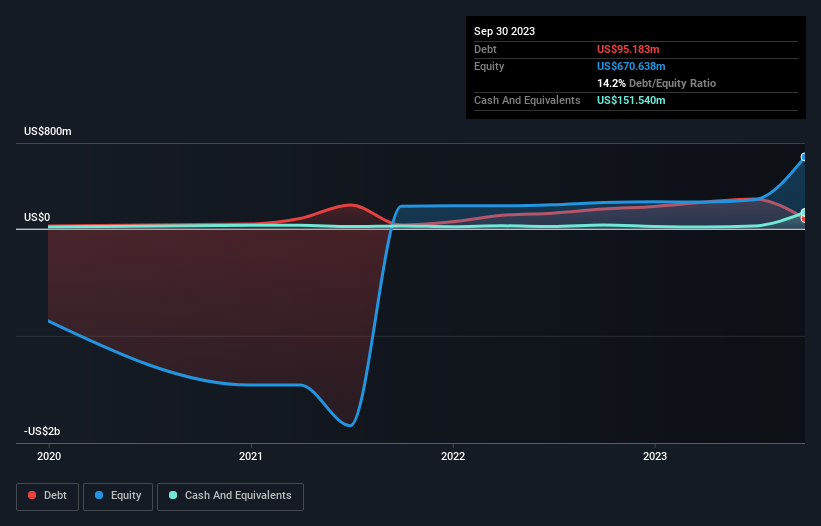- United States
- /
- Hospitality
- /
- NYSE:BROS
We Think Dutch Bros (NYSE:BROS) Is Taking Some Risk With Its Debt

Howard Marks put it nicely when he said that, rather than worrying about share price volatility, 'The possibility of permanent loss is the risk I worry about... and every practical investor I know worries about.' It's only natural to consider a company's balance sheet when you examine how risky it is, since debt is often involved when a business collapses. We note that Dutch Bros Inc. (NYSE:BROS) does have debt on its balance sheet. But the more important question is: how much risk is that debt creating?
When Is Debt A Problem?
Debt and other liabilities become risky for a business when it cannot easily fulfill those obligations, either with free cash flow or by raising capital at an attractive price. Ultimately, if the company can't fulfill its legal obligations to repay debt, shareholders could walk away with nothing. However, a more frequent (but still costly) occurrence is where a company must issue shares at bargain-basement prices, permanently diluting shareholders, just to shore up its balance sheet. Of course, the upside of debt is that it often represents cheap capital, especially when it replaces dilution in a company with the ability to reinvest at high rates of return. The first step when considering a company's debt levels is to consider its cash and debt together.
View our latest analysis for Dutch Bros
What Is Dutch Bros's Net Debt?
As you can see below, Dutch Bros had US$95.2m of debt at September 2023, down from US$183.9m a year prior. But it also has US$151.5m in cash to offset that, meaning it has US$56.4m net cash.

How Strong Is Dutch Bros' Balance Sheet?
We can see from the most recent balance sheet that Dutch Bros had liabilities of US$120.8m falling due within a year, and liabilities of US$847.6m due beyond that. Offsetting these obligations, it had cash of US$151.5m as well as receivables valued at US$9.14m due within 12 months. So its liabilities total US$807.7m more than the combination of its cash and short-term receivables.
Since publicly traded Dutch Bros shares are worth a total of US$5.05b, it seems unlikely that this level of liabilities would be a major threat. But there are sufficient liabilities that we would certainly recommend shareholders continue to monitor the balance sheet, going forward. While it does have liabilities worth noting, Dutch Bros also has more cash than debt, so we're pretty confident it can manage its debt safely.
Notably, Dutch Bros made a loss at the EBIT level, last year, but improved that to positive EBIT of US$52m in the last twelve months. When analysing debt levels, the balance sheet is the obvious place to start. But ultimately the future profitability of the business will decide if Dutch Bros can strengthen its balance sheet over time. So if you want to see what the professionals think, you might find this free report on analyst profit forecasts to be interesting.
Finally, a business needs free cash flow to pay off debt; accounting profits just don't cut it. While Dutch Bros has net cash on its balance sheet, it's still worth taking a look at its ability to convert earnings before interest and tax (EBIT) to free cash flow, to help us understand how quickly it is building (or eroding) that cash balance. Over the last year, Dutch Bros saw substantial negative free cash flow, in total. While that may be a result of expenditure for growth, it does make the debt far more risky.
Summing Up
While Dutch Bros does have more liabilities than liquid assets, it also has net cash of US$56.4m. So although we see some areas for improvement, we're not too worried about Dutch Bros's balance sheet. There's no doubt that we learn most about debt from the balance sheet. But ultimately, every company can contain risks that exist outside of the balance sheet. For example, we've discovered 3 warning signs for Dutch Bros (1 can't be ignored!) that you should be aware of before investing here.
If, after all that, you're more interested in a fast growing company with a rock-solid balance sheet, then check out our list of net cash growth stocks without delay.
New: Manage All Your Stock Portfolios in One Place
We've created the ultimate portfolio companion for stock investors, and it's free.
• Connect an unlimited number of Portfolios and see your total in one currency
• Be alerted to new Warning Signs or Risks via email or mobile
• Track the Fair Value of your stocks
Have feedback on this article? Concerned about the content? Get in touch with us directly. Alternatively, email editorial-team (at) simplywallst.com.
This article by Simply Wall St is general in nature. We provide commentary based on historical data and analyst forecasts only using an unbiased methodology and our articles are not intended to be financial advice. It does not constitute a recommendation to buy or sell any stock, and does not take account of your objectives, or your financial situation. We aim to bring you long-term focused analysis driven by fundamental data. Note that our analysis may not factor in the latest price-sensitive company announcements or qualitative material. Simply Wall St has no position in any stocks mentioned.
About NYSE:BROS
Dutch Bros
Operates and franchises drive-thru shops in the United States.
Solid track record with reasonable growth potential.

